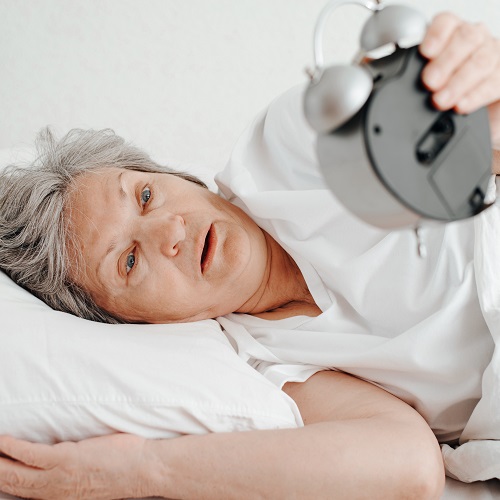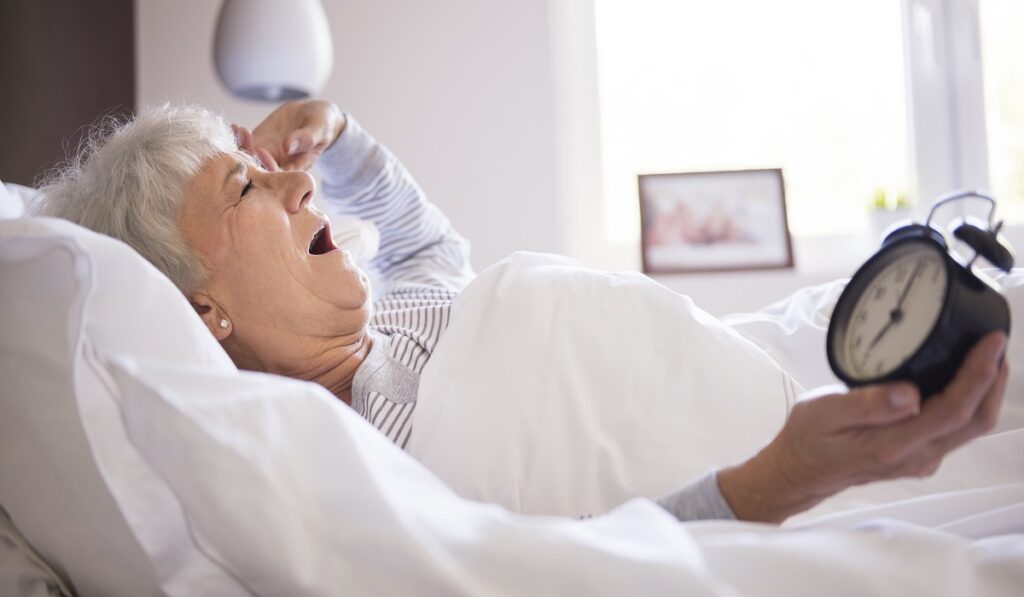Insomnia is one of the most common—and misunderstood—challenges older adults face. Many families mistakenly believe that sleep problems in elderly loved ones are simply a normal part of aging. But in reality, insomnia in seniors is often a sign of something deeper and, most importantly, something that can be addressed.
The good news? The right environment makes a difference. From natural light and quiet surroundings to personalized care and support, assisted living communities offer an ideal setting for improving senior sleep.
In this article, we’ll explore the root causes of insomnia in older adults, how poor sleep affects health, and why assisted living provides a uniquely supportive solution for restful sleep for elderly residents.
Key Takeaways
- Insomnia in seniors is common but not a normal part of aging.
- Causes include medical issues, medications, emotional stress, and poor sleep habits.
- Poor sleep affects physical health, mood, memory, and quality of life.
- Non-drug treatments like routines, activity, and sleep-friendly environments are highly effective.
- Assisted living offers structure, support, and personalized care to improve sleep naturally.

Understanding Insomnia in Seniors
Insomnia is typically defined as difficulty falling asleep, staying asleep, or waking up too early and not being able to fall back asleep. While anyone can experience these symptoms occasionally, chronic insomnia lasts for weeks or even months and begins to impact overall well-being.
For seniors, insomnia is incredibly common. According to the National Institute on Aging, nearly 50% of adults over 60 report symptoms of insomnia. That means half of older adults are struggling with sleep on a regular basis—yet many go undiagnosed or untreated.
Why does this matter? Because chronic sleep loss doesn’t just make someone tired—it compromises their immune system, raises stress hormones, and diminishes their ability to heal, learn, and connect.
In seniors, insomnia may also look different:
- They may go to bed early but wake up repeatedly.
- They might fall asleep easily but wake up at 3 a.m. and stay awake.
- They may rely on naps to function but still feel fatigued.
- They often hesitate to discuss it, believing it’s just “normal” aging.
Understanding insomnia as a treatable condition rather than an age-related inevitability is the first step toward a better life.
Common Causes of Insomnia in Older Adults
There is no one-size-fits-all cause of insomnia in seniors. Often, it’s a combination of medical, psychological, and environmental factors that contribute to sleep difficulties. Let’s break them down:
Medical Conditions
Chronic health issues like arthritis, heart disease, diabetes, and GERD can cause pain or discomfort that prevents restful sleep. Other disorders like sleep apnea or restless legs syndrome lead to frequent nighttime awakenings.
Neurological conditions, such as Parkinson’s disease or Alzheimer’s, often disrupt sleep cycles. People with dementia may experience “sundowning”—a phenomenon where confusion and agitation worsen in the evening, making it even harder to fall or stay asleep.
Medications
Many common prescriptions interfere with sleep quality. These include:
- Diuretics (increase nighttime urination)
- Beta-blockers (linked to vivid dreams or nightmares)
- Corticosteroids (stimulate alertness)
- Certain antidepressants and stimulants
Polypharmacy—the use of multiple medications—is especially common in older adults, increasing the risk of drug interactions that interfere with sleep.
Lifestyle and Environmental Factors
After retirement, daily routines often shift. Lack of structure during the day can throw off the body’s internal clock (circadian rhythm). Seniors may spend less time outdoors, nap frequently, or stay sedentary—reducing the natural build-up of sleep pressure and contributing to insomnia in seniors.
Environmental issues like noisy neighbors, bright lighting, uncomfortable bedding, or even an unfamiliar bedroom (as in a hospital or new residence) can trigger or prolong insomnia.
Psychological and Emotional Factors
Anxiety, depression, grief, and fear of the future all impact sleep. Emotional turmoil from losing a spouse, moving into assisted living, or feeling isolated can lead to chronic insomnia. Many seniors suffer silently, which means the emotional causes of sleep problems are often overlooked.
How Poor Sleep Affects Senior Health & Well-being
Sleep is not a luxury—it’s a necessity. When sleep is consistently disrupted, nearly every system in the body suffers.
Physical Health Consequences
- Increased inflammation: leading to joint pain, headaches, and chronic illnesses.
- Weakened immune system: making infections more likely and recovery slower.
- Increased fall risk: sleep deprivation impairs coordination and balance.
- Higher risk of heart disease: including hypertension, stroke, and irregular heartbeat.
Cognitive Health Effects
Sleep is essential for brain function. During sleep, the brain clears out toxins and consolidates memories. Without sleep:
- Memory becomes foggy
- Attention span decreases
- Decision-making slows
- Cognitive decline accelerates, particularly in those at risk of dementia
Emotional and Mental Health Consequences
Lack of sleep contributes to:
- Heightened anxiety and depression
- Mood swings and irritability
- Social withdrawal
- A reduced desire to engage with others
Diminished Quality of Life
Poor sleep affects everything: appetite, relationships, energy, confidence, and even willingness to participate in hobbies or physical activity. It’s hard to live fully when you’re always exhausted.
When is it Time to Address Senior Insomnia?
Because insomnia in seniors often develops gradually, it can go unnoticed for months or even years. Here are warning signs that sleep deprivation is interfering with your loved one’s life:
- Persistent fatigue despite going to bed early
- Frequent mood changes
- Trouble remembering things or staying focused
- Avoiding outings or family time
- Difficulty walking or maintaining balance
Keeping a sleep diary—noting bedtime, wake time, nighttime awakenings, and naps—can help caregivers or doctors spot patterns and provide effective interventions.
Effective Non-Pharmacological Approaches to Better Sleep
Pharmaceutical sleep aids may help short term but can create long-term issues. Many increase fall risk, cause grogginess, and disrupt natural sleep stages. Fortunately, non-drug approaches often work better and carry fewer risks.
Sleep Hygiene
Good sleep hygiene means setting the stage for rest:
- A consistent bedtime and wake-up time
- A cool, quiet, and dark bedroom
- No screens before bed (TV, phones)
- Limiting liquids in the evening
- Avoiding stimulating activities late at night
Structured Daytime Activity
Encouraging seniors to:
- Get daily sunlight exposure (resets circadian rhythm)
- Participate in light exercise (walking, tai chi, stretching)
- Stay mentally active (games, conversation, hobbies)
These habits help increase melatonin production and natural fatigue, leading to better nighttime rest.
Nutrition and Hydration
- Limit caffeine after 2 p.m.
- Avoid alcohol before bed—it fragments sleep
- Eat lighter dinners, at least two hours before bedtime
Emotional and Spiritual Wellness
- Provide emotional outlets: therapy, journaling, faith practices
- Use relaxation techniques: breathing exercises, meditation, or prayer
- Maintain social connections to reduce loneliness and worry
Creating a Sleep-Friendly Environment
A calming environment can mean the difference between tossing and turning or a restful night. Assisted living homes optimize these spaces:
- Comfortable bedding designed for pressure relief and mobility
- Noise control through thick curtains, carpets, and low-traffic halls
- Blackout curtains and nightlights for ideal lighting
- Thermostat control to keep rooms between 65–67°F
- Accessible bathroom layouts to reduce nighttime confusion or accidents
Even scent and color play a role: lavender, soft blues, and gentle lighting can promote a sense of peace and relaxation.
How Assisted Living Optimizes Senior Sleep
Here’s what assisted living can offer that’s hard to replicate at home:
Predictable Daily Routines
Having regular wake-up times, meals, and activities sets a natural rhythm. This helps seniors fall asleep more easily and sleep more deeply.
Nighttime Monitoring and Safety
Residents aren’t left alone if they wake up disoriented or in pain. Staff are trained to respond quickly and compassionately, preventing unnecessary stress or injuries.
Enriching Daytime Schedules
A full day of physical, cognitive, and social activities supports overall health and contributes to restful sleep. Tired but satisfied residents sleep better.
Personalized Evening Care
Each resident’s bedtime routine is honored. Whether that means a warm drink, soft music, or extra time preparing for bed, assisted living staff create a comforting nightly rhythm.
Tailoring Sleep Solutions for Every Senior
At facilities like Serenity Living Home Care, sleep support is not generalized—it’s customized. Trained professionals observe each resident’s needs and create targeted interventions.
- Reviewing medications that may interfere with sleep
- Adjusting light exposure throughout the day
- Managing chronic pain proactively, especially at night
- Offering calming activities for residents with cognitive impairment
- Involving families in creating familiar bedtime routines
Sleep quality is tracked, and care plans evolve as residents age or their needs shift.
The Long-Term Benefits of Quality Sleep in Assisted Living
Quality sleep fuels everything. When seniors begin to sleep better, the transformation is visible:
- Fewer illnesses and hospitalizations
- Increased appetite and hydration
- Better emotional regulation and happiness
- Enhanced memory, creativity, and mental focus
- Renewed interest in hobbies and relationships
Families also feel relief. Knowing a loved one is finally resting well provides peace of mind, especially after years of sleepless nights, stress, and exhaustion.
Conclusion
Insomnia in seniors doesn’t have to be a permanent struggle. When addressed with care, structure, and support, sleep can become one of the greatest sources of healing in later life.
If your loved one is battling fatigue, restlessness, or nighttime confusion, it might be time to consider assisted living—not just for care, but for rest. Because in the right environment, seniors don’t just sleep more. They live more.
Ready to explore how Serenity Living Home Care supports healthier sleep and happier lives? Contact us today and discover how we help restore peace, purpose, and a full night’s rest.
Frequently Asked Questions about Insomnia in Seniors
What causes sleeplessness in the elderly?
Insomnia in seniors is often caused by a mix of factors, including chronic health conditions, medication side effects, emotional stress, and changes in daily routines or sleep environments.
What is the best treatment for insomnia in the elderly?
The best approach often combines non-drug methods like good sleep hygiene, daily activity, and stress management. In some cases, medication may be used under medical supervision.
How to help elderly sleep through the night?
Support them with a consistent bedtime routine, limit naps, ensure their sleep space is quiet and comfortable, and encourage daily movement and natural light exposure to promote restful sleep for elderly adults.
What percentage of the elderly have insomnia?
Studies show that nearly 50% of older adults report sleep problems, making insomnia one of the most common health concerns among seniors.
Why is my 70 year old not sleeping?
Your loved one may be experiencing insomnia in seniors due to health issues, medication, stress, or lack of daily structure. It’s important to track patterns and consult a healthcare provider if it continues.


